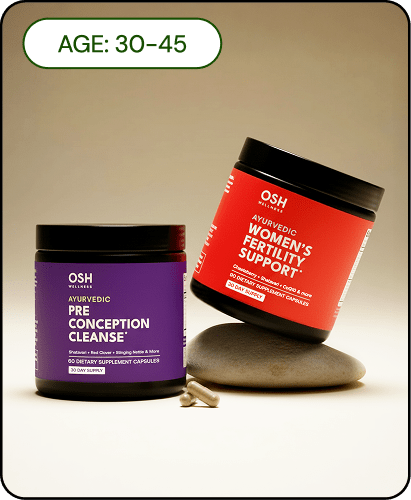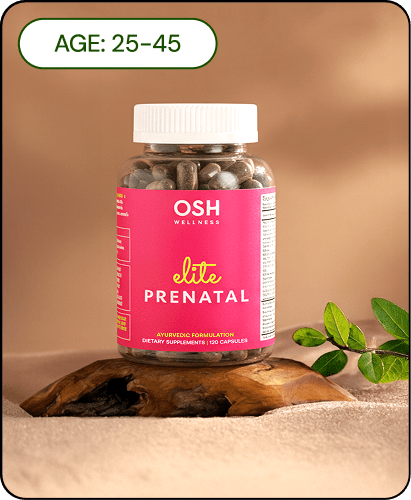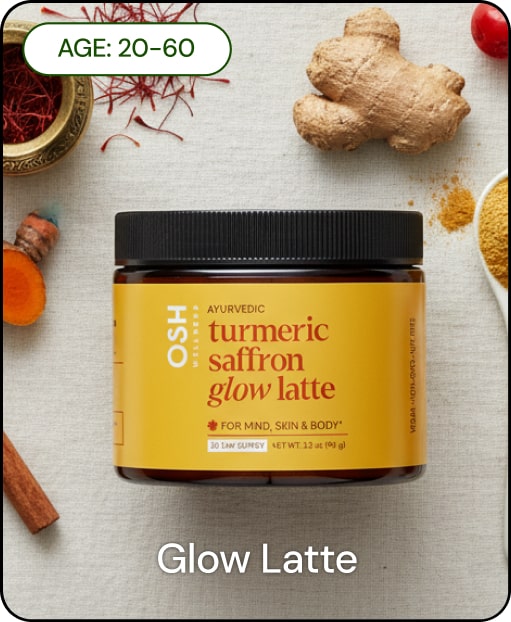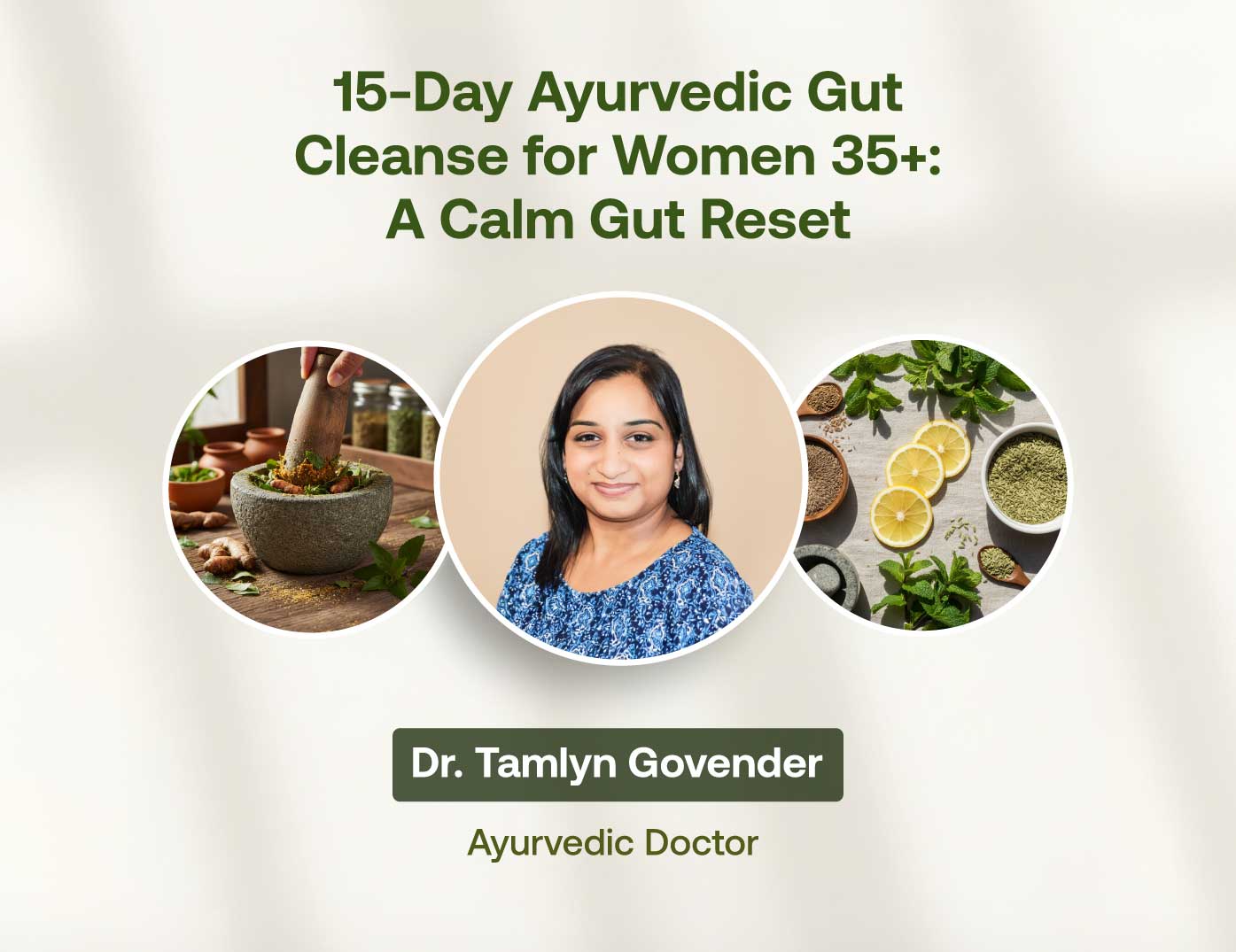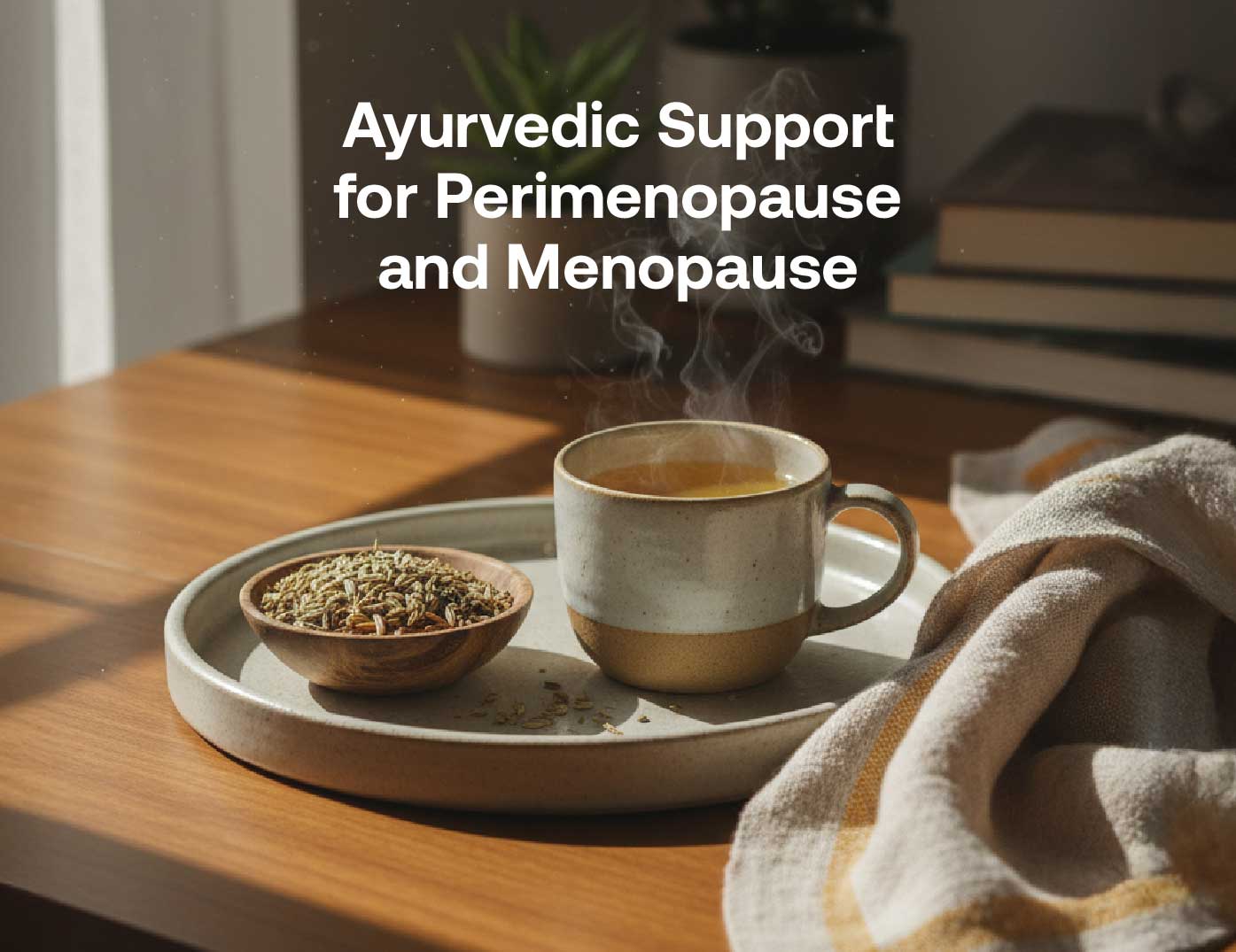Table of contents
As women transition into their mid-30s and beyond, they often experience hormonal, metabolic, digestive, and immune shifts that can contribute to gut sensitivity, bloating, or low-grade inflammation. The gut microbiome plays a pivotal role in managing these changes, influencing overall health and vitality. (1)
An Ayurvedic gut cleanse, specifically designed for this stage of life, primarily focuses on restoring digestive harmony, boosting microbiome diversity, optimizing metabolism, and fostering a balanced internal environment. By embracing preventive health through Ayurveda, women can proactively safeguard their well-being and reduce the risk of future health issues. (2)
A 15-day Gut Cleanse integrating Ayurvedic dietary adjustments (Langhana chikitsa), herbal remedies, lifestyle practices, and gentle cleansing techniques can empower women aged 35 and older to enhance digestion, elevate energy levels, improve mood, and cultivate lasting wellness.
How Ayurveda and Modern Science View Gut Health

Langhana (Fasting)
In Ayurveda, Langhana refers to a set of therapeutic practices that create a sense of lightness in the body. This is achieved by encouraging movement and reducing or lightening food consumption. These methods help relieve physical and metabolic heaviness, promote detoxification, and restore internal balance.
In modern medicine, this concept aligns with the concepts of intermittent fasting and autophagy. Intermittent fasting involves cycling between periods of eating and fasting, for example, the 16:8 method (16 hours of fasting and 8 hours of eating) or alternate-day fasting. This approach supports gut health by inducing autophagy and triggering beneficial physiological changes.
Agni (Digestive Fire)
Healthy digestion in Ayurveda depends on a balanced Agni (digestive fire). When digestion is weak or irregular, it leads to the accumulation of Ama (toxins or free radicals), which contributes to sluggish digestion (Agnimandya), inflammation, and bloating.
Modern science relates this to digestive enzyme activity and metabolism. Substances known as stomachic or appetizer agents enhance gastrointestinal function. Spices like ginger and black pepper contain bioactive compounds (such as gingerol and piperine) that stimulate digestive secretions, increase gastric motility, and enhance nutrient absorption. Piperine, in particular, helps activate digestive enzymes and improve nutrient bioavailability.
Pachana (Digestive Detox)
Ayurveda emphasizes Pachana as the process of digesting Ama to clear it from the body. Pachana herbs are typically used after Deepana to ensure the digestive fire is strong enough to eliminate toxins safely. Common Pachana herbs include Trikatu, Ajwain, and Fennel. Simple practices like sipping warm water also help detoxify and restore digestive health.
In modern terms, these correspond to digestive agents, substances that play an active role in promoting digestion and detoxification.
Deepana (Digestive Stimulant)
Deepana refers to consuming herbs or foods that stimulate the digestive fire (Agni) without directly digesting toxins. It boosts appetite, improves digestion, and prepares the body for deeper cleansing by enhancing metabolic efficiency. Common Deepana herbs include ginger, black pepper, cumin, and asafoetida, often taken before meals to prepare the stomach for digestion.
Modern medicine recognizes the gut microbiome as an ecosystem of bacteria, viruses, fungi, and other microbes that live in the digestive tract. This microbiome affects digestion, immunity, metabolism, and mood. When an imbalance occurs (known as gut dysbiosis or leaky gut syndrome), it disrupts these systems and impacts overall health.
Prakriti (Body Constitution)
Ayurveda describes each person’s unique constitution or Prakriti as a blend of Vata, Pitta, and Kapha. Modern research supports this concept. A study comparing the oral and gut microbiomes of individuals with predominant Ayurvedic prakriti types found that while core microbiomes were shared, each type had unique microbial signatures. These findings align with Ayurvedic physiological traits and suggest potential microbial biomarkers for personalized medicine, providing scientific support for prakriti-based Ayurvedic interventions.
What Clinical Research Suggests about Gut Health in Ayurveda

Triphala: This polyherbal formulation has demonstrated tremendous benefits on the gut microbiome, due to the presence of polyphenols and urolithins in its composition. As a result, Triphala has been clinically proven to improve the gut microbiota, promote beneficial bacteria, and prevent oxidative damage and inflammation. (10)
Virechana (therapeutic purgation): This Ayurvedic therapy is especially beneficial for inflammatory conditions. Clinical studies suggest that it can also reduce gut dysbiosis, improve metabolic markers (weight, blood lipids, glucose), especially in middle-aged subjects with obesity. (11)
Ahara and Vihara : Research shows that following an ayurvedic seasonal regimen, choosing better quality foods, following prakriti-based eating plans, timing meals, improving digestion, and lifestyle habits directly impact gut microbiome diversity and inflammation. (12)
Health Considerations for Women 35+

As women pass age 35, several physiological changes can impact gut health:
Hormonal fluctuations/perimenopause: Estrogen, progesterone, and other sex hormones begin to fluctuate. Estrogen decline can affect gut barrier integrity, gut motility, and microbiota composition.
Metabolic slowing: Basal metabolic rate tends to slow down; digestion may also be slower, and the risk of insulin resistance can increase.
Immune changes: The immune system’s regulation shifts; low-grade inflammation becomes more likely, which can be exacerbated by gut dysbiosis.
Lifestyle stressors: Work, family, less recovery time, possibly more mental stress, or poor sleep impact gut flora, digestion, and overall health.
This 15-day cleanse is a gentle and supportive Ayurvedic regimen focused on restoring digestive strength, supporting hormonal balance, and preserving overall health.
The 15-Day Ayurvedic Gut Cleanse

Here is a suggested 15-day plan to support your gut health through Ayurvedic practices. Always consult your doctor or Ayurvedic practitioner before beginning, especially if you have ongoing health conditions, take chronic medications, or are pregnant.
Days 1–3: Preparation
Goal: Lighten the digestive load and prepare the body for cleansing.
Diet & Herbs:
- Eat light, easily digestible foods such as stewed fruits with cinnamon, vegetable soups, and moong dal soup.
- Drink warm water in the mornings, and sip on CCF (cumin, coriander, fennel) tea or ginger tea throughout the day.
Lifestyle Practices:
- Engage in gentle movement like walking or yoga.
- Aim for at least 7 hours of restful sleep.
Days 4–7: Gentle Cleansing
Goal: Support intestinal cleansing and promote deeper removal of ama (toxins).
Diet & Herbs:
- Introduce mild Ayurvedic laxatives as guided by your practitioner, such as small doses of Triphala or castor oil.
- Consume thin rice gruel (kanji) and use gut-soothing spices like turmeric, cumin, coriander, and fennel.
- Include probiotic foods such as homemade buttermilk or fermented vegetables.
Lifestyle Practices:
- Incorporate pranayama or breathwork (like Nadi Shodhana) to enhance vitality and regulate the nervous system.
Days 8–11: Nourishing
Goal: Restore the gut lining and improve nutrient absorption.
Diet & Herbs:
- Add more whole grains, soaked legumes, and seasonal vegetables to meals.
- Include healthy fats such as A2 ghee.
Consume bone broths or vegetable soups for nourishment.
Lifestyle Practices:
- Engage in moderate exercise, yoga or gentle strength training.
- Practice meditation and pranayama to support stress reduction and digestion.
Days 12–15: Rejuvenation
Goal: Transition back to sustainable habits while maintaining gut balance.
Diet & Herbs:
- Gradually reintroduce variety with cooked vegetables and mild spices.
- Continue including fermented, probiotic, and prebiotic foods such as buttermilk.
- Support the body with herbs like Guduchi and Shatavari if needed.
Lifestyle Practices:
- Maintain good sleep and avoid processed, fried, or heavily spiced foods.
- Limit stimulants like caffeine.
Incorporate gentle oil massages and warm baths to support relaxation and rejuvenation.
What to Expect During and After the Cleanse

Short-term (within 1-5 days): Possible mild detox reactions (mild headache, minor digestive shifts, change in stool, bloating), increased urination or sweating if herbs have a mild diuretic effect.
Mid-cleanse (days 6-10): Better regularity, lighter digestion, reduced bloating or gas, and more energy.
Toward the end (days 11-15): Improved clarity, more stable mood, better sleep, subtle weight shifts, and improved gut tolerance.
Post-cleanse (week after): Maintain supportive habits, avoid reverting to previous poor dietary or stress behaviors. Incorporate at least 2-3 meals per week that include fermented foods, herbs, and digestive support.
Conclusion

An Ayurvedic Gut Cleans can offer a gentle reset by improving digestion, reducing endotoxins, supporting microbiome diversity, easing inflammation, and increasing metabolic health. When done with proper diet, supportive herbs, and lifestyle habits, this reset can produce noticeable improvements in digestion, mood, energy, and overall wellness.
Before beginning, please consult with a healthcare or Ayurvedic professional, especially if you have underlying health issues. Also, remember that sustainability and healthy habits matter; incorporating what worked in the cleanse into your daily life will produce long-lasting benefits.


